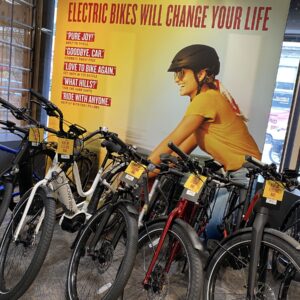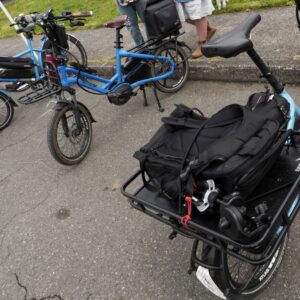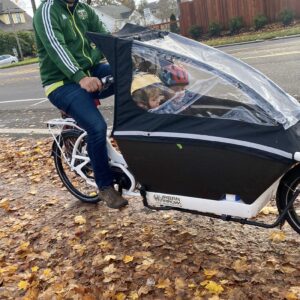
In September 2023, when Portland City Council voted to approve the five-year, $750 million Portland Clean Energy Community Benefits Fund Climate Investment Plan, they also gave a green light to using $20 million of those funds to implement an electric bike rebate program.
As BikePortland reported in May 2023, that’s enough money to help Portlanders purchase 6,000 e-bikes over the five-year timeframe of the plan.
The rebate program lives in a part of the CIP known as Strategic Program 6: Comprehensive E-bike Access and Support (SP 6). In the past year, staff from the Portland Bureau of Planning and Sustainability have been building the framework for how the program will work and now we’ve finally got news of an important update.
On June 26th, Portland City Council will host the first hearing for the e-bike program. According to BPS PCEF Transportation Decarbonization Program Lead Seetha Ream-Rao, they’ll bring an outline of the program scope to council in order to release a Request for Proposal (RFP) from organizations who might administer it.
E-bike rebate programs have proven to be extremely popular across the U.S. Just yesterday, when the State of Minnesota launch their new program — that gives qualifying individuals up to $1,500 and is funded with $2 million a year for two years — the website that handles requests crashed due to a technical issue. It is widely believed that intense demand overwhelmed the server.
In addition to the e-bike rebate program, the PCEF CIP includes over $80 million for bikes and climate-friendly transportation. Learn more in the stories below or in the BikePortland archives.







Thanks for reading.
BikePortland has served this community with independent community journalism since 2005. We rely on subscriptions from readers like you to survive. Your financial support is vital in keeping this valuable resource alive and well.
Please subscribe today to strengthen and expand our work.
Despite what seems like an occasional laudable program the PCEF has morphed into one giant slush fund being used “Willy nilly” to plug budget holes and support questionable nonprofit spending . It’s time to return it to the voters with a choice for a complete overhaul or cessation of it altogether. Poorly run local taxes are decimating public trust and confidence in both the city and county governments. It’s time to fix this.
Considering it was designed as slush fund for climate justice and voters overwhelmingly approved it as a slush fund for climate justice, I gotta say that your comment comes across like someone who is upset that “pragmatists/centrists” badly lost this vote and who is still whining about it (checks notes) 4 years later.
It will be interesting to see if a vote for repeal ever comes up on the ballot. Knowing what we now know, I think many who voted for it would feel differently.
I don’t understand this recent hullaballo over ebikes. Why can’t we just get people on normal bikes? Using state funds to subsidize ebikes seems ridiculous, especially considering that if people stopped driving they would save more than enough money to buy a fancy ebike on their own.
Studies show that e-bikes are more effective at replacing car trips. They go farther, faster and require less effort than a “normal” bike. I can vouch for this… I have a 22-mi/day commute–half of which with two kids on the back of the bike–and tried an analog cargo bike for a year. Despite being in good physical condition, I frequently “cheated” and took the car, because biking would take up three hours of my day and some pretty hefty physical effort (yes, Portland has hills) that I sometimes wasn’t up for. Since switching to an e-bike, I only ever break out the car when it snows or I need to run an errand somewhere like Beaverton.
It’s also a bit unrealistic to expect people who have driven their entire lives in a car-dependent society to first sell their car, and then buy a bike. I don’t know a single person outside of the very niche bike-crowd who has ever done that. Most people who buy a bike still keep their car for farther-out trips, and it often takes years for them to come around to the idea of fully un-tethering from the car… if it happens at all. And without selling the car, the e-bike becomes an added expense for them, regardless of how much cheaper it is than driving.
I’m perfectly fine with my tax dollars going to e-bikes. Even if an e-bike just replaces some of a driver’s trips, it still means fewer cars on the street, making it safer for the rest of us on bikes and foot, not to mention cleaner air, lower road maintenance expenses, less noise, etc. And as more people start to experience the benefits of biking, I’m hoping they will start demanding safer infrastructure to accommodate it.
I have been a bike commuter for 20+ years, on a lovely Univega. In November, I started a new job that in terms of distance and elevation gain would have been impossible for me to do consistently on my conventional bike, and so I did what I hadn’t expected I would ever want to do. I got a pedal-assist ebike. I have driven to my workplace exactly one time in nearly seven months, the day I brought in lamps and artwork to decorate my office. During the same period, I’ve put 1700 miles on the new ebike, which I use exclusively for my commute (evenings and weekends, I return to the Univega). I find it galling that we dole out federal dollars to pay people to be electric cars, trucks, and SUVs but not electric bikes, and I realize I am fortunate that I could “choose” to pay out-of-pocket for an e-bike for my new commute. We should definitely be subsidizing ebikes (as well as making public transit FREE … although my workplace, like many others, is nearly impossible to get to on public transit, even for someone like me who lives in a neighborhood with multiple bus lines), because we are already subsidizing cars, trucks, and SUVs in multiple ways (road maintenance, pollution costs, public health costs, etc.), and they are killing all of us.
I think someone like this is, of course, likely to use an e-bike for transportation. However, I’m not convinced that bike purchases actually result in a meaningful mode share shift (see pandemic bike boom/e-bike revolution and declining mode share in many cities).
I think e-bike subsidies are worthwhile even if a very small percentages of purchasers shift away from the car. However, I also think a better strategy would be to give money to people who switch to public or active transportation. A $1500 rebate could fund 15 months of $100 credits for not using a car for transportation…
One key advantage of ebikes over transit is that they offer the same door-to-door routing freedom as driving. I’m all for increasing transit service and frequency but it’s not an inexpensive proposition, compared to subsidizing ebike purchases. Ebikes activate our existing bike lanes and greenways, so there are no immediate barriers other than supplying affordable vehicle access to those who will use them.
This is the same thing as typewriters and pencils. They work really well, true.
But once you try an ebike, you’ll never look back.
Maybe you never looked back. I’ve tried several and still have no interest in owning one (rebate or not). So, speak for yourself.
I have asthma. I had not ridden a bike since middle school, and could not in Portland. I took a biketown 3 years ago and it changed my life. I put 3k miles/year on my ecargo bike, it has replaced driving for be entirely. If this is really what you believe, I suggest interacting with non bike culture people some more, maybe tag along on a bike bus and see how useful ebikes are.
That’s wonderful. Do you think people who release their car with a muscle-powered bike should also get a rebate?
Don’t let perfect be the enemy of better
There are dozens and dozens of studies that answer your exact question, if you type it into Google.
A cargo ebike took me, a person who was previously biking about 10 miles *per year at most* on a “normal” bike, to someone who bikes about 100 miles per month because I’ve replaced most of my shorter distance car trips with bike trips. And I gotta be honest with myself, if I tried to switch back to an acoustic bike, it’d go back to how it was before, purely because the perceived exertion was/is enough to keep me from doing it. *shrug* Ebikes are an equalizer. We don’t live in Amsterdam, where everything has been designed to be a bikeable distance for nearly everyone, so an ebike is what a lot of people need to turn things into a bikeable distance for themselves.
I’m not trying to say this rudely, I’m just wanting to say that you don’t have to feel the same way about ebikes as I do, but there’s a lot of data and many anecdotal stories like mine that pretty clearly answer what “the hullabaloo” is about, so it shouldn’t exactly be difficult to understand why ebikes are turning into such an important transportation option.
(Just please don’t be one of the biking purists that are salty their hobby is being infiltrated by “cheaters”, because those people are ridiculous.)
Aside from the electronic motor that makes biking way easier most ebikes come with some features not found on regular bikes that make them way more practical for trips:
It’s also really hard to discount the psychological benefit of the motor.
Seems reasonable to incentivize people to switch to forms of transportation more suited to their particular requirements. (This doesn’t need to be limited to ebike purchases, but it seems way more politically possible to do this than make it a blanket policy for bikes or something)
“According to BPS PCEF Transportation Decarbonization Program Lead Seetha Ream-Rao, they’ll bring an outline of the program scope to council in order to release a Request for Proposal (RFP) from organizations who might administer it.”
Why do outside parties need to administer this program rather than city staff? Set up basic requirements for what’s covered and what % / $ of purchase price is subsidized, then have the city open a spot to issue same day checks to purchasers with proof of purchase and a separate provision for bike shops to submit refund request with proof of sale with payouts to shops on general credit terms like within 15-30 days. I imagine almost any bike shop would want to be in the program and a net 15-30 payment schedule is a basic commercial credit term that wouldn’t impact bike shop finances. For the odd shop that wouldn’t want to do the credit thing, people could still purchase from those shops, but I’d imagine that it be a rarity and would not really preclude anyone from taking advantage of the program.
Why not give the same subsidy to regular bikes?